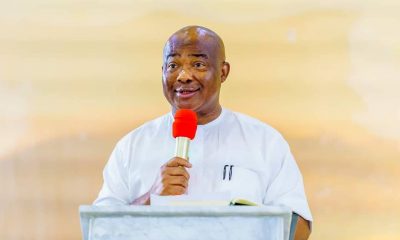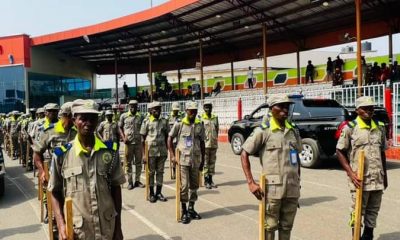Opinion
Okorocha: Imo’s Train Wreck

By Obi Nwakanma
By now, at least 99% of people in Imo state have come to the inevitable conclusion that the last eight years in Imo state is most certainly the worst in the history of this state which once embodied so much promise and so much verve and energy. Imo was not called “the heartland” of the East for nothing; it was always the heartbeat of Nigeria’s own “land of the rising sun” – with possibly the most educated population of highly technically and professionally trained people in all of the African continent per square mile. Easy to reach, compact and contiguous with other key epicenters of the region, and geographically the supply nerve of the Niger delta, whose key river sources – the Imo, the Orashi, the Njaba, and the Nworie, all flow through this state – and with a very high density of a vibrant middle class, Imo state is an economic miracle waiting to happen.
A picture of what Imo could be was shown very briefly in the “old Imo” of the late Sam Mbakwe, who unleashed the possibility between 1979 and 1983. To be fair, in the history of Imo state, only two governors have come up to scratch: its pioneer governor, the now retired Naval Admiral Godwin Ndubisi Kanu, who was later deployed to Lagos, but who worked to establish the foundations of the new state between 1976 and early 1978 with Promethean frenzy, building a formidable civil bureaucratic structure which served the state well in the long run, under the remarkable Moses Udebiuwa as Chief Secretary to the Government.
This civil bureaucracy was inherited by the elected civilian administration of the now late Mr. Sam Mbakwe, Lawyer and public administrator, who built his administration from the Public service with a vast pool of talent that shaped the developmental policies of Imo state, under the leadership of Professor Enoch Anyanwu, a Developmental Economist, Consultant to the UN Economic Development Commission, and Professor at the Alvan Ikoku College of Education, Owerri, before his appointment by Mbakwe as Chief Secretary to the government. Mbakwe’s Principal Secretary and Permanent Secretary at the Cabinet office – what we now call “Chief of Staff” – was Mr. Ekezie, the father of an old school mate of mine at the Government College in Umuahia. It so happened that it was the tradition for the Civil service, to maintain policy continuity and establish institutional memory, to supply the newly elected or even appointed governor with his Chief of Staff, who was the “Principal Secretary” to the governor, and also Permanent Secretary, Cabinet Office.
These days, these governors come with a retinue of cowboys, who often do not know where the facts are buried. Mbakwe’s Commissioner of Information and Culture was Mazi Ray Ofoegbu, one of Nigeria’s most formidable Political Scientists, and until his appointment, Senior Lecturer in Politics and Government at the University of Nigeria. With his powerful Director of Culture, the Cambridge-educated Gaius Anoka, they established the Ahiajioku Lectures Committee with formidable members like the late Professor Donatus Ibe Nwoga, Professor Emenyonu, Professor Agu Ogan, Mr. I.D. Nwoga, Chris Duru, Dr. A.O. Iwuagwu, Justice M. Eziri, Professor G.C. Ukaga, Uchegbulam Okorie and G.I.Odua, with the world class scholars of the Igbo world giving the lectures, beginning with the inimitable M.J.C. Echeruo who delivered the first lecture on the theme, “Ahamefula” in 1979. Anoka not only conceived and designed the logo of the Imo state University he also pushed through, with legislative support, the foundations of the Mbari Center and Museum of Igbo Material Culture in Owerri.
The diminution and underdevelopment of the original Mbari idea as conceived by Anoka and the Mbakwe government is one of the cruelest jokes of our time, and actually reflects the quality of political leadership we have had in Imo since 1983 – philistines. These are second-rate folks who have no scintilla of idea about culture and its fundamentals. That is why an Okorocha will embark on the project of putting in Imo, statues of insignificant figures with no historical symbolism in Imo, and not only that, commission second-rate sculptors, using second-rate materials in these ventures, when we have world class sculptors like the Oke Ibems of this world, and some of the finest contemporary artists and art historians in this world. A more capable and well-informed administration would have sought out an Olu Oguibe or a Chika Okeke or an Okwui Enwezor, or a Kelechi Amadi-Obi as a consultant, but I’m certain neither Okorocha nor his Adviser on Culture (who normally should be the Director of Culture in the state) has ever heard those names before in their lives. It is an indictment on the current Director of Culture in Imo state that s/he is unable to continue the powerful legacy of Gaius Anoka in directing Imo’s cultural policy at a world class level and stood aside while Okorocha violated the sensibility of Imo people with his crass installations and commissions of the most philistine examples of public art. As an art critic, and a careful collector of Contemporary Nigerian Art, I feel a sense of pique seeing the quality of these works, even irrespective of their significance. Speaking of Mbakwe, De Sam would have done it differently.
He was classy man. He brought this in his administration’s conceptions of public work. Mbakwe’s Commissioner for public utilities was my own father’s old teacher, the now late Mr. Alex Emeziem.
They went to South Korea, procured the parts for the Amaraku and Izombe Power stations, and used Engineers in the Imo state Ministry of Public Utilities to design, build, and install these power stations. The Imo state rural electrification project was 75% complete by December 1983 supervised by a Project Manager from the Imo state Ministry of Public Utilities, father of another friend of mime. So, was the Imo state Five-zonal Water projects, with all the pipes already reticulated, under the firm and efficient supervision of the Water Engineer from the Imo Ministry of Public Utilities, the old Seadog, Engineer Ebiringa. These were serious men.
The Governor was intellectually sophisticated, and had a well-established professional status as a giant at the Bar with one of the biggest Law firms in Aba, who had also been Administrator of Okigwe. He was not a helicopter politician flying in from Lagos or Port-Harcourt or Jos, to want to govern Imo state. He could therefore gather around him giants in their own rights, who gave Imo a first class administration. We use Sam Mbakwe always as benchmark because, he signifies completely that which is possible. The fact that it will take serious men and women to deliver first class public service to Imo, and to Nigeria in general. But take a look, and compare Rochas Okorocha’s Imo and Sam Mbakwe’s Imo.
Compare their backgrounds and values; the ethos that animated their quests as leaders. Mbakwe could reach out to the old Aba money – the Nnanna Kalus, the Richard Anyaehies, the M.O. Kanus, the F.U. Anyanwus, and young turks like Emma Iwuanyanwu, or Onwuka Kalu, and commit them to donate their resources for the advancement of Imo rather than just take. He had ideas, and marketed it to the people, who were happy to pay the extra tax, and make financial contributions through the old “self-help” process made popular by the great Zik. Mbakwe had a compliment of first class civil servants: it was a civil service that still had at its top echelon well trained people with education from world class universities – from old Ibadan, Oxford, Cambridge, Harvard, St. Andrews, Makerere, and so on. They not only had the education, they were trained in the proper civil service routine. They were the equals of their political leaders, who it was understood were birds of flight, while they were permanent but invisible hands of power. They nonetheless offered, and were indeed expected to give first class counsel and advise to the politicians so that the wheels of administration would run smoothly. Compare those days – the Imo State High Courts headed by a Sylvester Chukwudifu Oputa – who would sooner put an erring Governor in his place without missing a step. Compare the Imo state House of Assembly, with an experienced HSK Osuji as Majority whip, and the “young turk” – Mike Ahamba – always in fierce, oppositional debate as leader of the NPN caucus in the House, who gave the leadership of the government as much as he got. And it was all polite. No one sold his conscience.
The Assembly reports of the Imo Broadcasting Service was a delight for many of us High Schoolers with an eye already for public service. In a sense, Imo people deserve whatever has happened to them. They have not only elected and tolerated politicians who have no respect for them, but they have sat mostly whingeing without doing anything about it. If your leaders do not fear you, they will screw you. If you do not look carefully, you will elect an “akalogoli” or a country bumkin from Orlu who was never truly, intellectually prepared for the kind of public leadership he was entrusted, and for whom therefore the meaning of leadership is informed largely by a cargo mentality. Imo has a chance to elect men and women in the next election cycle of great capability, starting with the crucial delegation to the Imo House of Assembly.
The IMHA was the real missing link in Imo, for in the end, the greatest betrayers of Ndi Imo were the men and women they elected into the House of Assembly: these were third rate people. They failed in their one duty – to keep the elephant away from the China shop. Next time, Ndi-Imo must look very carefully before they leap, because the Okorocha years were a train wreck, and must serve as a cautionary tale, about empty barrels, like those who promise “philanthropy” over real, quality “service.” It will take Imo three generations to recover from this train wreck. But the spade work must begin.
Disclaimer: The views and opinions expressed here are those of the author and do not necessarily reflect the official policy or position of Oriental Times












